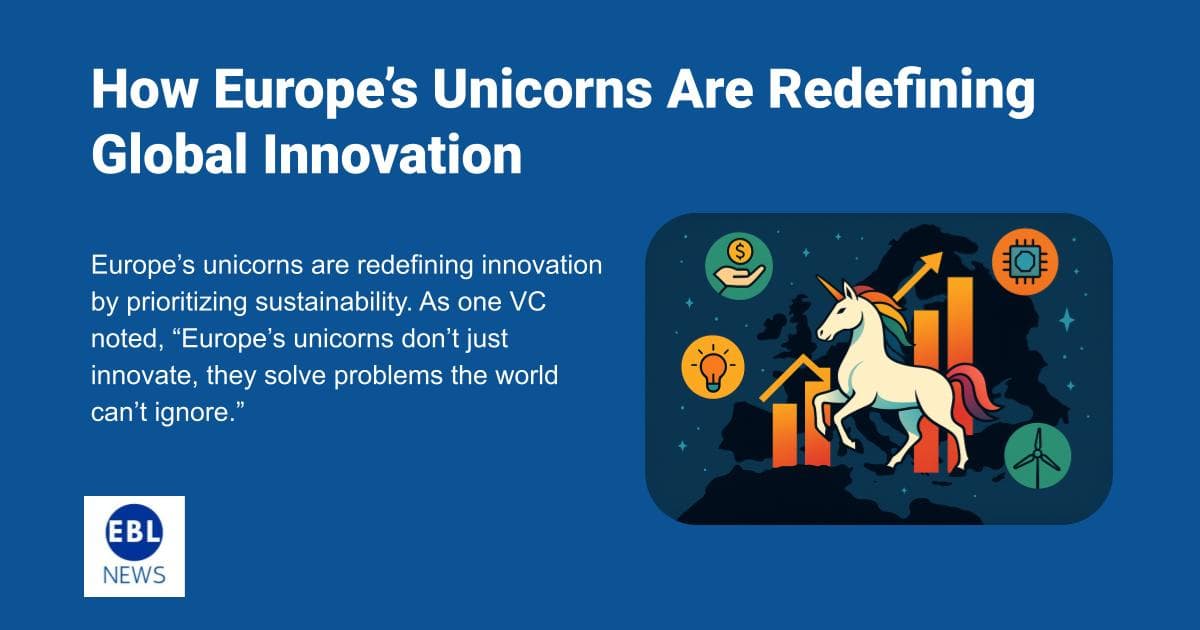Europe’s startup ecosystem has birthed 128 unicorns—privately held companies valued at $1 billion or more—as of early 2025, according to Failory, mounting a credible challenge to U.S. and Chinese dominance in global innovation. From fintech to cleantech, these high-growth firms are reshaping industries, attracting billions in investment, and setting new benchmarks for sustainable growth and regional impact. This feature explores how Europe’s unicorns are driving innovation, the strategies behind their success, and the challenges they face in scaling further.
The Unicorn Boom: By the Numbers
In 2024, Europe added 32 new unicorns, bringing the total to 128, with a combined valuation approaching $450 billion, though figures vary across sources. The UK leads with 48 unicorns, followed by Germany (26) and France (22). Fintech remains dominant, making up a significant share of unicorns (e.g., Revolut and Klarna), while cleantech and AI are rising rapidly, boosted by EU sustainability mandates and widespread AI adoption.
Venture capital (VC) funding in Europe reached an estimated $28 billion in 2024, down from previous highs amid economic headwinds (Crunchbase).
Strategic Advantages
1. Leveraging Regulatory Tailwinds
European unicorns thrive by aligning with policies like the EU Green Deal and Digital Markets Act (DMA). Cleantech startups such as Agreena use carbon credit frameworks to monetize sustainable farming, though its current valuation likely remains below $500 million.
The EU’s €1.4 billion 2025 innovation budget, including a €300 million STEP Scale-up scheme, supports these efforts with targeted grants (European Commission).
2. Global Talent Acquisition
With 5.7 million developers in Europe (InApps) and world-class universities like ETH Zurich and Imperial College, talent remains a strength. Companies like Bolt ($9B) aggressively recruit across borders, offering equity and remote-first work cultures.
Initiatives such as EIT Digital’s “Choose Europe” provide incentives for non-European researchers to relocate.
3. Strategic Partnerships
Unicorns grow by partnering with corporates and governments. Adyen ($65B) supports global retailers like IKEA, while Wallbox ($1.5B) collaborates with utility providers to expand EV charging networks.
4. Niche Market Focus
Many unicorns target high-value niches. Supercell ($11B) thrives in mobile gaming with titles like Clash of Clans, while Celonis ($13B) leads in process mining, helping businesses optimize operations.
Case Studies: Unicorns in Action
Revolut (UK, $45B): Expanded into crypto (Revolut X) and telecom, leveraging its EU banking license to serve over 52 million users. AI-driven fraud detection reportedly saved €500 million in 2024.
Mistral AI (France, $6B): Launched Mixtral, a cost-efficient, open-source model attracting over a million developers. It recently introduced “Le Chat,” an enterprise-focused chatbot.
Northvolt (Sweden): Once valued at $12B, the battery giant filed for bankruptcy in late 2024 but secured $245 million in bridge funding to restructure and continue its EV battery mission.
Challenges Ahead
Funding Gaps: Late-stage VC funding in Europe fell 57% in Q3 2024 to $4.2 billion, limiting scale-up opportunities (SeedBlink). Europe's reliance on government VC (37%) contrasts with the deep-pocketed pension funds in the U.S.
Regulatory Complexity: Operating across 27 jurisdictions drives up compliance costs. While GDPR and DMA promote trust, they can reduce profit margins by up to 12% for smaller tech firms.
Exit Pressures: Only 22% of European unicorn exits in 2024 were IPOs, compared to 40% in the U.S.. Down rounds are rising (22% of deals), leading some startups to explore U.S. listings for better valuations.
Talent Retention: With salaries 50% lower than U.S. averages, many European tech workers consider relocating. Reports suggest 90% of top tech talent are open to opportunities abroad.
The Global Impact
Europe’s unicorns are not just building companies—they’re changing paradigms.
Northvolt, even amid restructuring, aims to power 1 million EVs annually, reducing CO₂ emissions by 10 million tons.
Mistral AI is challenging Big Tech’s grip on AI with its open-access ethos.
Klarna is pushing financial inclusion by expanding BNPL services into emerging markets.
In 2025, expect a sharper focus on AI and cleantech, fueled by the EU’s €300 million STEP scheme. Yet to truly rival the 600+ unicorns in the U.S., Europe must bridge its late-stage funding gap and streamline regulations.
As one VC put it: “Europe’s unicorns don’t just innovate—they solve problems the world can’t ignore.”


